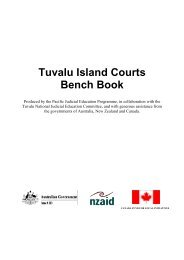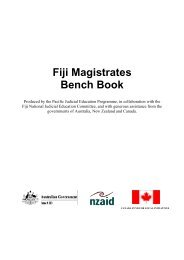Codes of Judicial Conduct in the Pacific - PacLII
Codes of Judicial Conduct in the Pacific - PacLII
Codes of Judicial Conduct in the Pacific - PacLII
You also want an ePaper? Increase the reach of your titles
YUMPU automatically turns print PDFs into web optimized ePapers that Google loves.
What are <strong>the</strong> dangers or disadvantages <strong>of</strong> harmonisation?<br />
As <strong>in</strong>dicated above, an attempt to develop a common code might ei<strong>the</strong>r result <strong>in</strong> a very<br />
generalised statement <strong>of</strong> pr<strong>in</strong>ciple (giv<strong>in</strong>g little effective guidance) or, by attempt<strong>in</strong>g an<br />
exhaustive coverage <strong>of</strong> all possible cont<strong>in</strong>gencies, become overloaded and over-complicated.<br />
Ei<strong>the</strong>r way <strong>the</strong> result would not fur<strong>the</strong>r <strong>the</strong> <strong>in</strong>terests <strong>of</strong> justice.<br />
As regards a move to affirm or agree basic pr<strong>in</strong>ciples, my pr<strong>in</strong>cipal concern is that scarce<br />
resources might be diverted to support high level academic discussion when <strong>the</strong>y could be<br />
used to much greater advantage elsewhere such as <strong>in</strong> <strong>the</strong> provision <strong>of</strong> tra<strong>in</strong><strong>in</strong>g regard<strong>in</strong>g<br />
judicial ethics and basic skills for judges <strong>in</strong> very remote areas. Such tra<strong>in</strong><strong>in</strong>g is relatively<br />
expensive because <strong>of</strong> <strong>the</strong> time and cost taken by travel.<br />
Who would benefit?<br />
In my visits to <strong>the</strong> remote island courts <strong>of</strong> Tuvalu and Kiribati it became very clear that <strong>the</strong><br />
pr<strong>in</strong>cipal issues for <strong>the</strong>se judges are want <strong>of</strong> tra<strong>in</strong><strong>in</strong>g and want <strong>of</strong> materials <strong>in</strong> local language.<br />
After <strong>the</strong> workshops, participants volunteered that <strong>the</strong>y had learned from <strong>the</strong> discuss<strong>in</strong>g <strong>the</strong><br />
application <strong>of</strong> pr<strong>in</strong>ciples. I am unsure, what if any, additional benefit <strong>the</strong>se judges stand to ga<strong>in</strong><br />
from a move to harmonisation.<br />
Any discussion spann<strong>in</strong>g <strong>the</strong> member PICs is almost certa<strong>in</strong> to be a 'high end' discussion<br />
between senior members <strong>of</strong> <strong>the</strong> judiciary s<strong>in</strong>ce it is <strong>the</strong>y that hold <strong>the</strong> responsibility for guid<strong>in</strong>g<br />
<strong>the</strong>ir country's judiciary. They are also more likely to have <strong>the</strong> language and <strong>the</strong> technology to<br />
communicate freely with each o<strong>the</strong>r. There is noth<strong>in</strong>g to suggest that <strong>the</strong> more senior judges<br />
are not fully conversant with <strong>the</strong> pr<strong>in</strong>ciples <strong>of</strong> judicial conduct. It is <strong>the</strong> more junior, less<br />
experienced and especially <strong>the</strong> lay judges who need help <strong>in</strong> this regard and most <strong>of</strong> <strong>the</strong>m<br />
would perforce be excluded from <strong>the</strong> debate; currently very, very few <strong>of</strong> <strong>the</strong> local judges have<br />
access to <strong>the</strong> <strong>in</strong>ternet and <strong>in</strong> any event language issues would prevent <strong>the</strong>ir tak<strong>in</strong>g part <strong>in</strong> any<br />
pan-<strong>Pacific</strong> on-l<strong>in</strong>e debate.<br />
Dur<strong>in</strong>g <strong>the</strong> National Coord<strong>in</strong>ators' Workshop I was able to <strong>in</strong>vestigate how o<strong>the</strong>r jurisdictions<br />
deal with <strong>the</strong> follow<strong>in</strong>g issues regard<strong>in</strong>g <strong>the</strong> application <strong>of</strong> <strong>the</strong> pr<strong>in</strong>ciples <strong>of</strong> conduct <strong>in</strong> small<br />
communities:<br />
1. Community <strong>in</strong>volvement<br />
To what degree is it proper for local judges to <strong>in</strong>volve <strong>the</strong>mselves <strong>in</strong> <strong>the</strong>ir community?<br />
Can judges properly participate or hold <strong>of</strong>fice <strong>in</strong> traditional councils?<br />
Is it reasonable to expect a local judge to live <strong>in</strong> isolation with<strong>in</strong> a small community?<br />
2. Impartiality<br />
In determ<strong>in</strong><strong>in</strong>g what relationships are too close for a judge to sit, should we weigh <strong>in</strong><br />
<strong>the</strong> balance <strong>the</strong> consequences <strong>of</strong> recusal?<br />
Are <strong>the</strong>re legitimate steps that can be taken to negate any appearance <strong>of</strong> bias?<br />
Does what a reasonable man would th<strong>in</strong>k change accord<strong>in</strong>g to circumstances and <strong>in</strong><br />
<strong>the</strong> light <strong>of</strong> custom so as to alter <strong>the</strong> degree <strong>of</strong> relationship which would prohibit a judge<br />
from hear<strong>in</strong>g a case?<br />
3. Conflict with tradition and custom<br />
Are <strong>the</strong>re any circumstances <strong>in</strong> which <strong>the</strong> requirements <strong>of</strong> tradition dictate behaviour<br />
contrary to <strong>the</strong> ethics and <strong>the</strong> pr<strong>in</strong>ciples <strong>of</strong> conduct?<br />
F<strong>in</strong>al Report - Ker<strong>in</strong> Pillans - July 2011 Page 4 <strong>of</strong> 10

















